#and shows a massive lack of basic empathy and understanding of how human emotions work
Explore tagged Tumblr posts
Text
.
#'sorry for barging' anon#sorry gonna answer this in the tags since it's such a loaded topic#but yeah exactly- i think a lot of it comes down to people wanting them to perform their (very real) grief for an audience#and getting mad when they don't. which is wildly unfair and unrealistic and just... extremely entitled#and very much coming from a lack of understanding of grief and that it's not a perpetual state of uncontrollable crying#a massive part of grief is continuing living with all its up and down moments with a new heavy weight in the background#living in a perpetual state of sobs is not something any human can sustain. it involves adapting and continuing to live.#and that involves doing regular everyday things AND experiencing happy moments still. that does not mean you aren't still suffering.#to question whether they're 'truly' grieving is.... kinda evil and completely ridiculous lmao#and shows a massive lack of basic empathy and understanding of how human emotions work#we see less than 1 percent of their lives. to actually feel like you have the ability to judge someone's grieving process in general#is wild and weird but especially when you literally have seen nearly none of their lives in the past few months#i'm sure all of us have laughed and seen a friend and had other happy moments since october#that doesn't mean we do not miss liam and that we aren't devastatingly sad at other points.#and to somehow think that zouis reconnecting and being happy about it after such a tragic event would be somehow anti-liam is insane#i've even seen people judge zayn for not cancelling his entire tour which is so.....#if they for a second think that liam would have been petty enough to enjoy the idea of all of his friends stopping in their tracks forever#they clearly didn't really know him since he was clearly always SO supportive of everyone in 1d#and probably would have been very happy to see zayn and louis mend their relationship#it feels like a very weird way to make a fucking death and real life grief from his friends into a stan war which is......... beyond gross
37 notes
·
View notes
Note
Is it just me or are some of the more intense Imaudna folk…kind of mirroring Imogen’s over-defensiveness of Liliana? Or at least uncritically accepting Imogen’s assessment of her, without acknowledging her “bias”? (as we are now apparently calling the characters’ family - so K-pop of us)
I’m not saying she’s a terrible mother - she’s literary moving heaven and earth for Imogen [and herself] - but she’s helping bring about what could be an apocalyptic event, on the off-chance that it could relieve them of their powers.
And I get why people wanna ignore that in favor of Imogen reuniting with her Mom and building a relationship with her. But it’s frustrating when you remember that some of the people her Mom has fucked over include Kiki and the Ashari (not just Orym) and that she’s working with a guy that allowed Trent’s abuse of Caleb, who Beau has spent years working to take down, and we still don’t know what’s happened to those two.
Again - shades of gray, and we all love villains and complicated, messy women. But it’s quite the slice of cognitive dissonance to see fandom *really* pile on Fearne’s parents for abandoning her (especially when it was only six years as far as they knew), but even after she’s party to nearly murdering Kiki, we shouldn’t be assuming the worst of Liliana?
(Just read this back and…I don’t think some these Imaudna fans are actually Marisha fans)
I don't think it's mirroring Imogen, per se. Or rather, I think this is all part of the larger trend I've touched upon for some time: there are a segment of shippers with absolutely no empathy for or generosity towards anything that interferes with the ship. Ideally, they'd like to also support Imogen and Laudna as individuals; but even then the ship comes before the characters. As you said, they're not really Marisha - or Laudna - or for that matter Imogen or Laura fans. They're fans of them playing characters who are in a relationship together.
When Imogen was upset with Laudna for breaking the gnarlrock, there was a pretty prevalent attitude of "but it wasn't LAUDNA's fault, so why is Imogen upset, that's unfair" even though the rock is still broken and it happened when it was in Laudna's possession and, frankly, had Imogen not given the rock to Laudna, she'd still have it. In retrospect this has gotten even more wild, because since then, they've leaned very far into the negative effects Imogen experiences as a result of her powers as an argument as to why she's allowed to do whatever she wants, but at the time if you pointed out Imogen found relief from the rock and is justified in having an emotional response, you were met with screams of HOW DARE YOU BE MEAN TO LAUDNA. This hypocrisy is of course tied into the lack of empathy, because said lack of empathy rests on granting infinite grace to those who support or even merely recognize the ship, no matter their other actions (eg: Otohan), and dismissing the feelings of anyone else.
When Laudna died, it was a pretty common attitude among Imogen and Laudna shippers (I would say Laudna fans, but quite honestly almost every post grieving her was just as much about the ship as the character) that Orym would have been happy to have remained dead because he was a widower. This is a horrifying mentality to have - people's partners do die young, and most people choose to continue living - and was also notably untrue based on Liam's statements both in and out of game. You'll notice that "Orym doesn't want to die and felt like this was a massive failure" on 4SD never took off, but "Orym can't be objective" on 4SD has been blown to ludicrous proportions that show a stunning lack of understanding of like...basic human emotions and their role in decision-making. Because there's no consistency except The Ship.
When the party went to Whitestone, and Percy was in fact played as someone with very complicated and layered feelings about death and dying, and who was not going to change his developed principles for a stranger, he was lambasted. The fact that Delilah Briarwood is just as responsible for his trauma - repeatedly so, she was the architect of both his family's murder and the reason why Vecna achieved godhood, she's literally why his brother-in-law is dead, the Briarwoods have been responsible for two of Vex's deaths - was completely ignored. The fact that Vex and Pike were not spiting him in the end, but rather developed a mutually acceptable plan that permitted Laudna's resurrection with a contingency plan to kill her if Delilah returned led to some pretty harsh criticism of them as well.
FCG was pretty popular among the shippers for quite some time because he wanted everyone to get along and wanted Imogen and Laudna to make up after the gnarlrock fight (note: this is also true of Ashton and Orym, both of whom as discussed have since fallen from grace because they continued to exist as characters with their own thoughts and motivation) and had a lot in common with Imogen. However, a series of things occurred that led to their fall from grace among the shippers. The first was that FCG's coin is why Orym was resurrected instead of Laudna. The second is that Shared Dream was not, in fact, intended only to let Laudna go into Imogen's dreams, but rather allowed anyone in the party to go. The third is that FCG started to find a purpose beyond "help others no matter what," particularly after realizing they had a soul and were in fact a person, and specifically began exploring religion. Religion is unpopular with Imodna shippers particularly after 3x49 and Imogen's consideration of the Vanguard, but there's also definitely a mix of obvious ex-fundamentalists who never unpacked their feelings and instead just want all their fiction to validate their new beliefs. The fourth is that FCG/FRIDA "stole" the first canon relationship spot (which also confirmed that FCG was, in fact, shippable rather than some kind of robot eunuch with nothing better to do than push Imogen and Laudna together). And so you get some really fucked statements. Like, when I say I've seen "I hope someone makes that robot eat their stupid coin" that's not exaggeration; it's pretty much verbatim. That's not a post that a person who makes any attempt to understand experiences other than their own can make in earnest, but it does make sense from the perspective of someone who has decided Imogen and Laudna's relationship is the heart of the show and is angered that five other main PCs exist and have their own interests.
Ashton occupies a truly fascinating space, in that they're oddly popular, in part because their scenes with Laudna are genuinely unmissably fantastic scenes for Laudna. It's one of the only places where Laudna takes off the mask (though she's started to with Orym too). He also overlaps with a lot of what makes Imogen popular, except it's canon where Imogen's is subtext, or it's obviously more severe (Imogen's mom left? Ashton's an orphan. Imogen's had a few headaches? Ashton has chronic pain). So they hated when he pointed out he'd been abandoned by his friends in a way Laudna hadn't (also because Ashton and Laudna's conversation in 3x49 was just far more honest than Imogen and Laudna's, and because Laudna sought them out), but they like him when he's supportive of Laudna. They're constantly on the thinnest of ice because of this and because they're a genuinely compelling character, but because of that, might get in the way of what said shippers want, namely, a hundred episodes of Imogen and Laudna sipping tea at Zhudanna's and having a lovely time.
Following Imogen considering joining the Vanguard, Orym fell out of vogue despite his previous interactions with Imogen, because he very justifiably pointed out, as I've said, that the Ruby Vanguard killed his husband and his father-in-law (whom he saw as a father figure himself), and used a toxin that ensured they couldn't be brought back. I've talked about this a ton and so I'm not going to rehash every aspect, but the fact remains that while I like Imogen's choice to do this - conflict is fun! It makes sense for her character! - it's an incredibly insensitive thing to say. (It blows Ashton's statement about loneliness out of the water, for sure; incidentally, Ashton pointing out the more general hey girl they murder everyone who disagrees did NOT sit well with the hey let's harass everyone who disagrees crowd.) And when you mix it in with the god stuff discussed regarding FCG, Orym has become the periannath non grata of choice to the point of a similar response to the gnarlrock fight - if you sympathize with him, they see it as an attack not just on Imogen but on Laudna, for...not talking about Laudna as well. This has only gotten worse with Orym firmly committing to destroying the Vanguard, to the point that there are, generously speaking, misunderstandings or misrememberings of the text, and less generously speaking, outright lies. A notable one is that Laudna begins to tap into Delilah before Orym nods (Marisha's mention of the purplish hue is at 2:52:02 in episode 3x63; Orym's nod is at 3:01:42, a solid 9+ minutes later); he supports her decision, but he is not responsible for it.
Then there's the guests. Deanna was obviously made to ask Imogen about Laudna. She's here to ask them if they're married. She's here to encourage Imogen to follow her heart. She's definitely not here to have her own active and interesting love life and personal feelings about the gods (that conflict with Imogen's) and history and perspective. Oh she's...she's calling out Imogen's nonstop use of psychic powers? She's having a three-way with Chetney and Fearne? FRIDA is hooking up with FCG and admitted their anger about the gods was mostly due to projecting their personal anger about feeling powerless and having been awoken without their consent? Uhhhhhh Deni$e was obviously made to to ask Laudna about Imogen. She's definitely not here to be a connection to Dariax and have her own active and interesting love life and personal feelings about the gods. Wait, no, maybe Bor'Dor will ask about it? Uhhhhhh *flips coin but not in an FCG way* Laudna will *rolls dice* mentor Prism and this will...make this ship happen? Oh, won't these people with their own distinct personalities and motivations who keep having conversations with Orym and Ashton and each other stop doing that and just presume that a specific one of the four other people in Bells Hells they've never met and probably don't remember the names of is married to Laudna? Won't someone stop playing their character as a fully fleshed out person whose life is entirely unaffected by Laudna and Imogen's respective love lives? Oh and then Bor'Dor did ask about the relationship, and it was because it was a weakness and he was trying to infiltrate.
Quite literally? It goes as far as the gods! Why didn't they save Laudna? To which I'd say sure, let's explore what happens if they did! Let's follow this thread! Do they just save Laudna and maybe her family and no one else? Why Laudna? Does she get saved at the expense of some other dark-haired girl in Whitestone? Or perhaps they save everyone. Perhaps the De Rolos remain in power, and Campaign 1 doesn't fucking happen I guess, and Laudna grows up, and she lives out the rest of her life in Whitestone, and she's a woman in her 50s now - maybe even married, perhaps with children - and has never been to Marquet and wouldn't know or care about some random 20-something with purple hair. Like, what are you driving at here? Maybe the gods let Laudna die because that was the only way to bring her to Imogen. Ever think of that? (alternately: how do you know they didn't? What if Laudna's undead state has to do with Vecna? You didn't specify if it was the Primes or the Betrayers, or how she gets saved; she's still living after a hanging, which some might consider a miraculous gift. What if it was the Dawnfather acting through the Sun Tree? Can you describe what you want the gods to have done and where that puts us in 843 PD or do you just say shit hoping no one will ever poke at it?) When do the gods intervene? Do they make sure nothing bad ever happens to anyone? Are mortals just dolls the gods move around with no free will?
So anyway. I don't think these feelings about Liliana are based on mirroring Imogen's thought process. I do not think there is a level of consideration that Imogen and Laudna have motivations (motivations mean they can be something other than perfect flawless victims who found each other). It is simply "Imogen wants this, Laudna will validate anything she does, and so it's correct." The party line for anything else "fuck your trauma, fuck your dead family and dead loves, fuck your own hopes and dreams and goals: you exist only to fawn over two random-ass women. It doesn't matter if they are strangers to you. It doesn't matter if you've only met one of them. It doesn't matter how they act towards you. It doesn't matter if you're one of them, if you step out of line. This is your sole purpose, and if you fail, you're not a person to me." There's absolutely no thought put into the implications of anything they say beyond "it supports the ship, or, if not, it perpetuates the blameless, perfect and thus boring frozen state of the characters."
73 notes
·
View notes
Note
Hey in s1e1 Allura compares each of the pilots to the lions. I don't really remeber what they were something like Hunks caring personality, Pidge's inquisitive nature etc but Allura was cut off before revealing Lance and Blue's (by Lance lol) and I've always wondered what theirs was. Maybe u have a good idea cause ur really good and putting 2 and 2 together and finding X. Hope this makes sense.
Official interviews with the writers have stated Blue’s nature is compassion! She’s a nurturing presence described as the “mother hen” of the Lions. This makes a lot of sense because you can see Lance doing this a lot- like in s3e6, when he takes up a sniper nest, he checks on his teammates and watches them to see if and how they need help. Also in s3e3 Lance is the most aggressive and outspoken about how the team needs to stick together and helping them reunite.
This also is reflected a lot in how Blue relates to Allura in s3e3- she doesn’t respond to being ordered or commanded by Allura but instead responds very powerfully to Allura expressing vulnerability and asking for help- and basically the lesson she imparts to Allura is it’s okay to not control everything, other people are here to help you.
Throughout the show, Blue and Lance have repeated themes to their arc and interactions. There’s a sense of trusting situations- Lance often unlocks powers or discovers properties by just going into situations and sorta trusting it’ll work out and being mostly vindicated. The first thing Blue does is run wild and hurtle around at terrifying speeds and Lance noticeably isn’t scared that the Lion is out of his control, just caught off-guard at first. Anybody else in his situation would panic- think about how Shiro reacted when Black was moving without him in s2e7.
Allura begins her speech with “As you have found, the Lions choose their pilots” confirming that Blue had already selected Lance as her chosen paladin.
She continues, “The quintessence of the pilot is mirrored in his Lion.”
So simply enough, we can tell something about the Lions by the paladins they first approached- the Lions seek people who are mirrors of themselves.
Ergo, Blue was drawn to Lance by being able to see his empathy and compassion as a person- the same kind of spirit that drew him to defend Pidge. He has that sort of empathetic, emotionally wise and supportive nature- as well as a certain openness to things working out. I think it’s significant that Lance got his Lion first- because Lance is the sort of person who would take Blue at face value.
Walking into the mouth of a giant robotic predator and plunking himself in the seat just because she’s indicating for him to do so, because it feels right, because he lets Blue into his heart and mind without hesitation or fear- Lance is opening himself wide up because to connect to anything, he connects emotionally.
This is nicely embodied in that Blue’s element is water. Water is often seen as an embodiment of the emotional world and the subconscious. I’ve said this before but while all of the paladins have emotional conflicts, Lance is the one who knows the most about his and will often be seen taking initiative and discussing them quickly, rather than waiting to explode.
Onto the other Lions... Allura describes Black, first:
The Black Lion is the decisive head of Voltron. It will take a pilot who is a born leader and in control at all times, someone whose men will follow without hesitation. That is why Shiro, you will pilot the Black Lion.
The first adjective given to Black is decisive. The reasoning and decision-making head, which on a human body is the nexus of sensory information and the seat of the nervous system. Understand, take in information as fed by the limbs and act on it.
“In control at all times”, however, tells us that this is not just the cozy seat of the commander. The Black Lion is a heavy burden. You have to consider what control tends to mean for Shiro, someone who is keenly contextualized by trauma, imprisonment, and the anxiety disorder that sprung from it.
“In control” means staying ahead of mental demons. It means having autonomy over his own life and mind, things that the empire is all too eager to take away from him.
From the start, Black evokes this concept of the heavy crown- royalty in the purest sense, a leader who even bereft of regalia or title is seen and known as a king. A person crowned simply because they are charismatic, wise, and assertive- someone people reflexively look to for leadership. And also, a heavily burdened, weighted individual.
Black is represented by space- the sky at its most unbounded, the most liberating. When all Lions are empowered by their element, Black commands the greatest domain, and their massive scarlet wings are a promise of ruling that domain, of soaring through it. That’s a potent promise to make to an ex-prisoner.
But at the same time, space is also the sky at its most transient- space is a vacuum. The seat of Black’s power, this infinite kingdom, is also nothingness. It cannot be held in the hand, it cannot be touched.
Black is thematically associated with the juxtaposition of opposites. The imagery of an eclipse, and teleportation abilities that allow the user to be both present and absent- there and not, disappearing but asserting themselves.
“In control” of the Black Lion is to walk a tightrope act between power and mercy, fear and certainty. It is to command, but to also surrender oneself to trust. Shiro out of the team is the one most often confronted by a sense of helplessness.
So what sums up the Black Paladin? A mind under heavy pressure. That’s a hell of a challenge, and this is why we can see that the Black Paladin mentality can break, can fall off the tightrope in so many ways. Zarkon fell off the tightrope one way- arrogance, refusal to heed the warnings of his senses, disconnect from the limbs, leadership turned into tyranny. And in s3 and s4, Shiro falls off a different way- lack of self-worth, guilt, internalizing, trying to hand the burden to someone else because he assumes he’s no longer worthy of the throne.
But we’re not giving up on Shiro just yet- and he has the potential to rise above the situation.
The Green Lion has an inquisitive personality, and needs a pilot of intellect and daring. Pidge, you will pilot the Green Lion.
Curiosity is the defining trait of the Green Lion. A desire to know, a desire to investigate. I think that this can sometimes lend an overly benign image to Green, that people read her as fundamentally childish, “ooh, what’s this?” but there’s something else here, and something that’s illustrated big time in s2e4.
Green is represented by nature and plant life, but also technology. When Pidge deepens her bond with Green, we’re treated to an image of roots growing upwards and transforming into circuitry.
Simply, Green represents the concept of evolution. Grow, change, and become something entirely new- radically recreate your identity to thrive in an environment previously hostile to you. Quite apt for Pidge who created a new identity to find her family.
But that comes back to the concept of “daring”. If Green was just an overexcited investigative toddler then you wouldn’t need to be ‘daring’- daring suggests boldness, a certain degree of assertion in the face of problems. Which makes sense- it takes some serious determination to try and grow where you’re not welcome. Curiosity, for Green, comes with a spirit of relentlessness- it’s the tenacity with which a forest retakes the four-lane highway cut through it, pothole by pothole, weed by weed.
It’s the willpower required to fight your way through setbacks, failed harvests, and to exploit a mind that naturally thinks outside of the box against situations that are unkind. Interviews have also stated the Green Lion is not a destructive creature by nature- Green would rather find a way to open the puzzle box than take a hammer to it. Which also reflects well Pidge’s propensity for stealthy, technical fighting.
The Yellow Lion is caring and kind. Its pilot is one who puts the needs of others above his own. His heart must be mighty. As the leg of Voltron, you will lift the team up and hold them together.
This gives us a bit of insight into legs in general, which is needed since Lance just set himself up to be skipped, but it tells us some interesting things about the Yellow Lion.
Taken alone, this summary sounds very sacrificial, that the Yellow Lion runs himself ragged to protect others. But this is contextualized very differently when we see the Yellow Lion himself.
Yellow is an armored juggernaut commanding the greatest defensive armaments and a body that can smash directly through most adversaries. He’s the quintessential defensive force on Voltron, the most fortified Lion- set diagonally across from Red, the quintessential offensive force and least defensive Lion.
Yellow’s relationship with his allies is that he is a shield and a foundation to others- he’s the leg that anchors Voltron to the earth below them and, in the manner of Atlas, takes the world onto his shoulders. Yellow’s burden is heavy, but Allura emphasizes that “his heart must be mighty”- the role of Yellow Paladin is gifted to those who are built for this, who have the strength and force of will.
And again, this sometimes creates more of a benign image than what we see in practice. The Yellow Lion is forceful and assured. In contrast to Blue, who presides over the realm of the emotions, Yellow rules the very material and practical realm- and he is particularly concerned with threats. He makes a shield of his own flesh to deny enemies access to his allies, but he also won’t sit there passively in the face of those foes- in inclination to take care of his own, the Yellow Lion will level mountains, tear through steel, shatter stone. Strength of will, strength of body, the determination of a protector who says “No, I don’t think so, you aren’t getting at my friends today.”
And, sometimes, slams into said friends hard enough to send them spinning.
The Red Lion is temperamental and the most difficult to master. It’s faster and more agile than the others, but also more unstable. Its pilot needs to be someone who relies more on instinct than skill alone. Keith, you will fly the Red Lion.
At first glance Red- and Keith himself- seem to be arrogant loners. “Temperamental”? Too cool for everybody else?
But this is a false pretense through and through, and the rest of the description warns us about that. “Unstable.” “Relies on instinct.” Red is a glass cannon of a Lion- the greatest damage output, but something he pays for with the greatest fragility.
Again, the more we understand of Keith, what at a glance seems like hotshot confidence, not needing a team, is actually self-sufficiency born out of a lifetime of isolation. The instability and temper of the Red Lion is born from a sense of being wounded- grief, loss, and isolation. Red is needy, loyal, and the most aggressively responsive to his paladin in danger. In s2e6, Allura tells us that Red wasn’t like this before- the Lions never did this before.
Red’s prior paladin, Alfor, was surrounded by people, and largely, happy. His loyalty and commitment to his family as the literal right hand of the paladins was rewarded by a relatively long peacetime, the esteem of his peers, the adoration of his people. Those who were close to Alfor have nothing but good things to say about him. It’s a big deal in the flashback when Zarkon actually argues with Alfor over the rift.
But that happiness crumbled. Alfor died trying to save everyone else from what became of the rift, of Zarkon. In loyalty, he left himself behind as a sacrifice- in duty, he faced Zarkon alone, trying to take responsibility for his commander. The person he trusted.
And Red followed Alfor with bonding to Keith. Keith- the orphan of uncertain history- Keith, not a loner, but lonely. And connecting to Keith, we see Red with newfound anxiety, newfound sense of loss, newfound fear.
At his best, Red affords an insight beyond conventional means. It was Red who was able to reveal to Alfor the nature of Voltron and what their bodies needed to be- the nature of the paladin bond. Red is the oracle of Voltron. Like his combat capabilities, this is a potent advantage.
And yet, like fire, Red is needy. More than the other elements, fire can starve and weaken very easily. It can be destroyed, disrupted, extinguished- or rear up too greatly and destroy others around it. Fire can only thrive, really, with the nurturing graces of the other elements. Wood to feed it, air it can breathe. Water and earth to bank it and stop it from blazing out of control.
#voltron legendary defender#vld#Blue Lion#Black Lion#Green Lion#Yellow Lion#Red Lion#readmore#jaggster17
126 notes
·
View notes
Text
Diamonds? (Steven Universe Spoilers right from the get go)
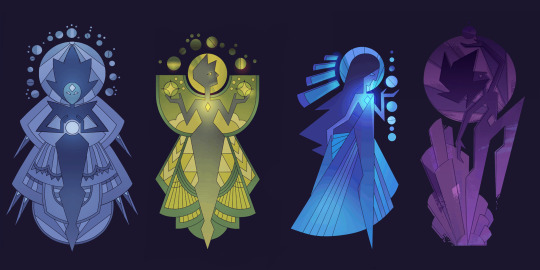
While I was sitting there browsing through a lot of people’s comments and thoughts on the most recent episode and the reveal of Pink Diamond being Rose Quartz. Something struck me as kind of odd (besides the lack thereof many people talking about Bismuth, smh)
What IS the purpose of the Diamonds? What are their ultimate goals and motives? On the basic level we know that the Diamonds create these kindergartens to mass produce gems with nearly singular purposes.
Be they warrior gems used either in war time or as general security / army hierarchy that have their own niches.
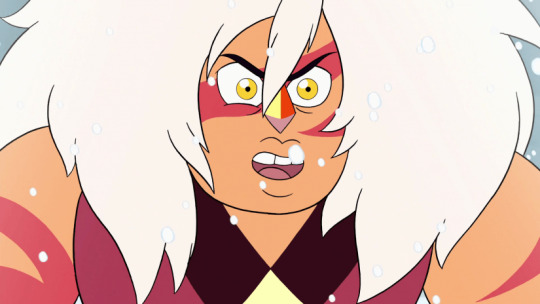
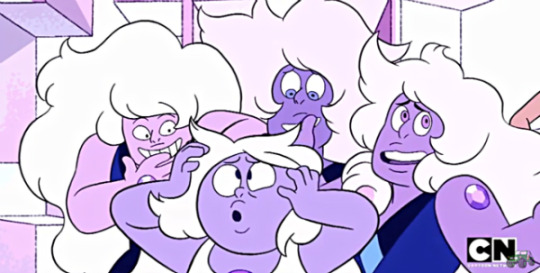
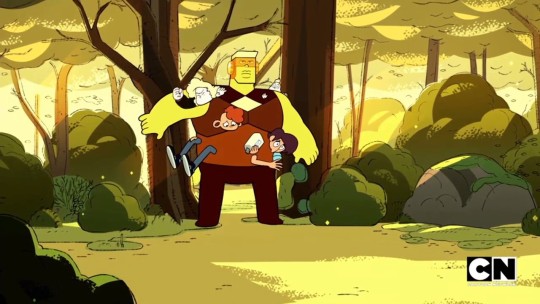
Peacekeepers to keep things in line. (Yes, lets not forget this little shit actually managed to stop Alexandrite effortlessly)
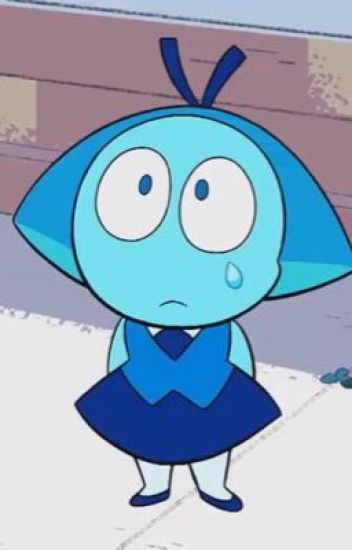
Gems to observe, maintain, record and maintain efficiency.
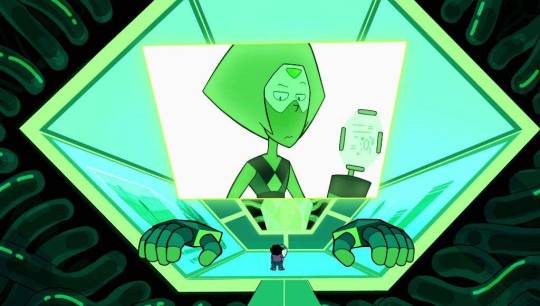
Gems to terraform planets (At least that’s what I assume Lapis’ main function is for? Sure she can use it extremely well for fighting, but it can also be assumed she could use those powers to manipulate where you want the water to go and since water erodes rocks, she could potentially use that to cave away at rocks to... Well, terraform.)
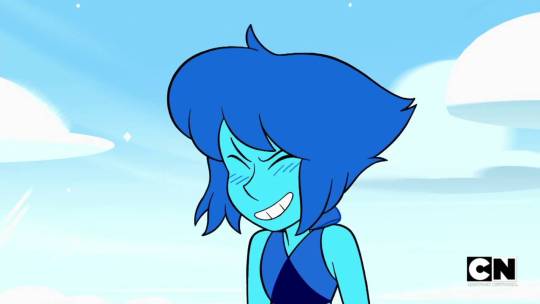
And specifically there are two gems I want to point in the direction of where I’m going with this that led me down this train of thought:
•The Pearls that are obedient to their masters to the very end
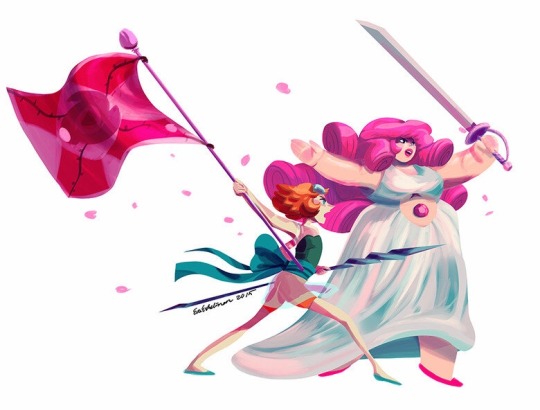
(Beautiful image done by Evelmiina on Deviantart that I found while searching Google for images)
•And the Sapphire used to predict the future
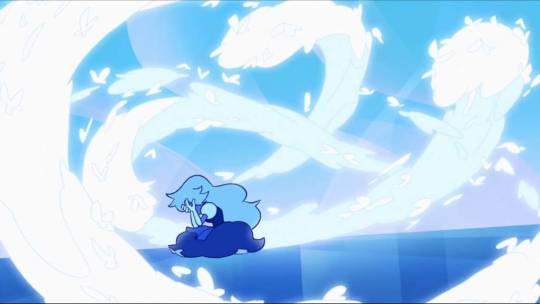
Where I’m going with this is that in a full retrospect, the way that Homeworld and the Diamond hierarchy operate is almost liked a well oiled machine to produce and repopulate these gems and spread across the galaxy.
But... For what purpose? As seen from Yellow and Blue they don’t necessarily hold any bonds to their Gems that they control, at the very least we know that Yellow Diamond more or less sees them as pawns nothing more, nothing less. Even so much as to try to go beyond that of their own “attorney” gems (and would have successfully done so were it not for Blue Diamond being there wanting to know more).
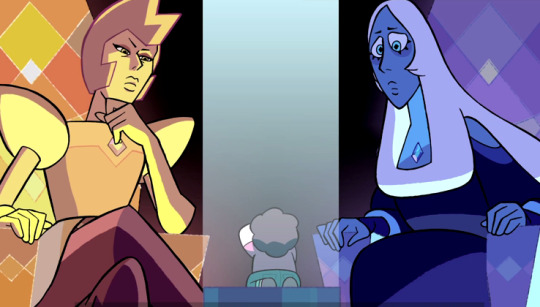
What are their purpose? Their motives, their goals? What do they ultimately want to accomplish from all of this?
It intrigues me and genuinely makes me want to know, because in a sense, it makes me wonder... Are Yellow and Blue “programmed” like the rest of the Gems to serve their “role” as a Diamond?
And if so, why?
I think it’s loosely hinted that the Diamond hierarchy works like a “color wheel” you have Yellow, Blue, but no Red. We instead have Pink Diamond.
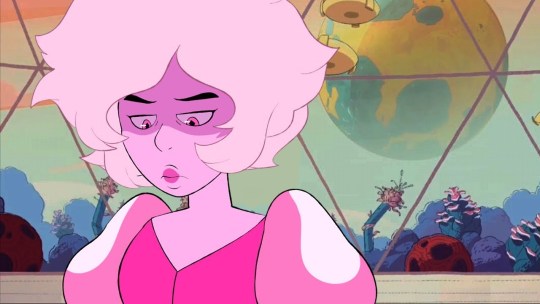
Pink is in a way “kind of” like red, a red that is saturated with white to create it’s own experience.
She in a sense is a “defect” from the regular Diamond hierarchy. In a way, it would have even made more sense for her to be a “Green Diamond” then that of a Pink, Green is still on the color wheel, albeit not as a primary color, but as a secondary created from yellow and blue.
Though in spite of that defect she was still very much loved by her sisters Blue and Yellow. She wasn’t cast away like many of the of the other gems that aren’t “up to snuff” and thrown away to do menial things.
Sure she wasn’t given her own planet right away, but I think that could be chalked up to “immaturity” and still needing to be taught.
But one of the universal truths amongst the Diamond hierarchy is that the Diamonds are more or less given free will to have their own thoughts and emotions and do so in their own unique ways, even Pink, who albeit was being confronted by the other two for not doing her job “well” they didn’t seem to have any real care in her having her own little side projects or even to experience the world in her own way. (Ala the Zoo)
So long I assume as they still carry out their tasks at hand.
As far as we’re aware Yellow and Blue didn’t really know or fully understand that Pink genuinely cared for humankind and didn’t want to destroy their planet, maybe because she never truly confronted them about it, I think they had hints thrown at them (with ya know, the Zoo and everything), but I think they perceived it as how a human looks to their pets, not how Pink wants to experience free will, to watch things grow organically and not mechanically.
Could it be that Pink is so different from the other diamonds because she may have inherited more from White then what was originally intended, making her Pink?
And what about the mysterious White Diamond?
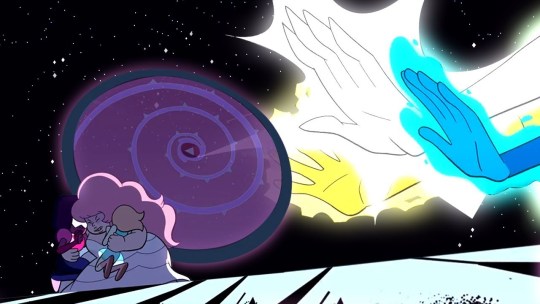
As of right now the most we’ve ever seen of White Diamond has been that of silhouettes and a hand reveal.
But from this reveal it’s confirmed that White Diamond is even larger then that of Blue and Yellow.
The natural appearance of what we all associate with diamonds is more or less that of a white appearance.
And excuse me, because I am actually not all that knowledgeable on Color Theory so I can’t talk about the specifics of it, but I do know of the old “Pink Floyd” triangle that when light hits the spectrum it creates the color.
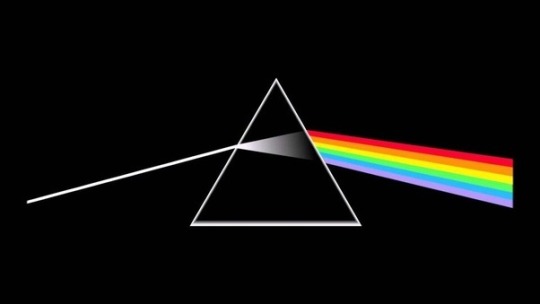
Leading to infer that White Diamond was the original diamond, the precursor before the other two, in a sense the triangle of the color spectrum.
What is that light, that made White Diamond create the other Diamonds, to create this machine of artificial “artificially” intelligent beings that are intended to serve no other purpose but the ones they are designated?
Are the colored Diamonds also intended to be “programmed” like the rest of the gems?
How does this “programming” work, is it mental or is it physical?
None of these can be solidly answered as of right now.
Though the terrifying thought of it all is, are Gems truly free thinking?
We know they can love, they can form bonds, they can learn and grow mentally, show empathy, show plenty of emotions, they’re not artificial constructs, they’re beings too.
We see that from so many cases from Garnet’s whole existence to even the two Topaz’s loving each other deeply and being pained at the thought of being separated.
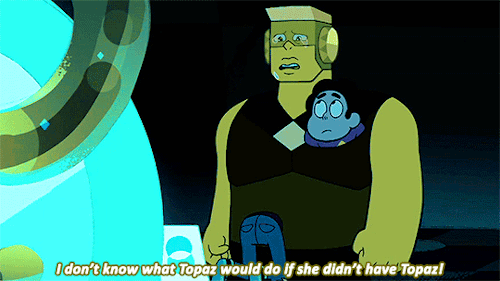
Hell, even Aquamarine’s empathy for them after the fact when she decides not to report them.
But after seeing Sapphire and Pearl in these last couple of episodes.
Sapphire is clearly “programmed” not to “see” the future, but assess it’s probabilities, and even if she can see the things that unfold mentally, it’s still in a way just creating a list of outcomes with a probability tacked on.
This clearly torments in her in certain ways as she’s trying her hardest to find out why she can’t just predict the future, especially when it comes to Steven, how things aren’t just black and white like they usually are.
(Do note while I’m primarily talking about Pool Hopping and that it’s Garnet, it still seems mostly to be thoughts hailing from Sapphire’s side of the fusion)
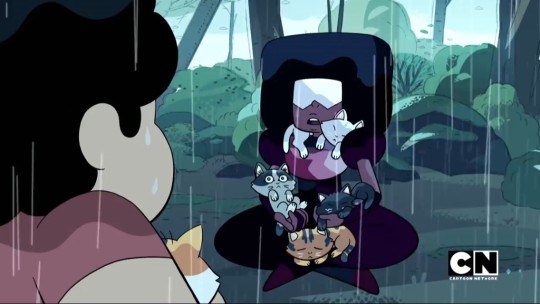
And when she thinks it’s finally clear after the events of “Pool Hopping” and that she just needs to stop treating Steven as if he stills needs to grow and be protected at all times.
The reveal of Pink Diamond being Rose Quartz throws her for a loop and upsets her to no end, mostly being because Rose isn’t who they thought she was, but there’s also probably the lingering thought of this not being even a .0001%
(though that last bit was primarily assumptions on my part, and I’m not even certain if that will be touched on, but knowing Steven Universe the smallest of things are massive foreshadowing, ala Bismuth saying that Rose’s sword was designed for “a fair fight and not to shatter a gem”)
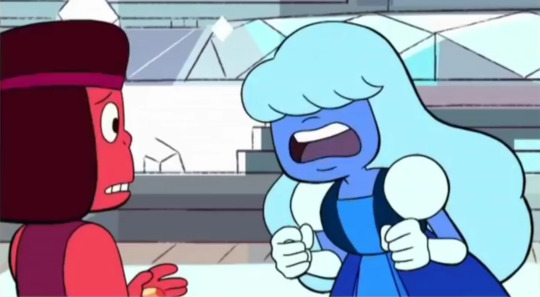
It creates this hook that sinks in and makes it feel that there’s something in her mentally that hooks onto these “foresight” powers way more then what she really needs to.
Personally I don’t think Gems are programmed “mechanically” so to say, what leads me to question that and to wonder if my sentiments on that are actually true. Is the one that makes me sympathize even more with her then what was already previously shown thanks to the episode of “A Single Pale Rose”.
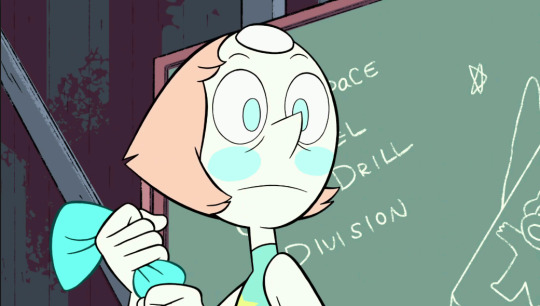
Pearl
Pearl honestly wasn’t a character I ever considered as my “favorite” but still loved and cared about her just as much as any of the others.
But god, what they’ve shown in the most recent episode pains me to no end.
Pearl was always a character I could relate to knowing first hand how painful unrequited love can be. Knowing that the person you can love from the deepest part of your heart, the one person that you will always feel will always be the most special to you, no matter how much you try, no matter how much you want to change that... They will never love you back.
But was her love for Rose... Really her own? I think more or less, yes, she truly did love Rose, she grew those feelings for her beyond that of respect and loyalty.
But as we know, Rose never felt that way towards her. Whether that’s from her own assumption that she wanted Pearl to not feel like she’s bound to Pink Diamond anymore and being ignorant to Pearl’s feelings, or simply because she didn’t ever feel that way towards her.
Everything that occurred in “A Single Pale Rose” I feel can really start the process for closure within Pearl, she no longer has anything bound to her to keep as a secret, the burden she held within her for centuries... Never being able to repent for the sins she and Pink committed from that one simple act.
The deaths of hundreds if not thousands of Gems on her and Pink’s shoulders.
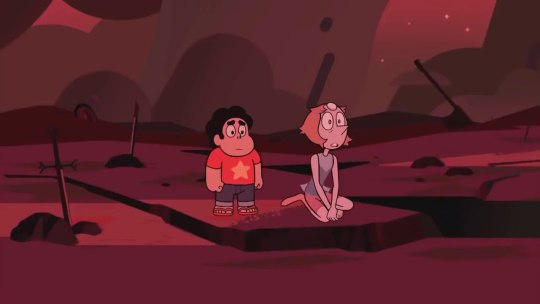
But... Why couldn’t Pearl speak of this any sooner? Did she honor and care about Rose too much for her to go against her last promise to her?
Or... Could it be because of Pink Diamond saying the phrase “As my last order from me to you as a Diamond... Please... Lets never speak of this again.”
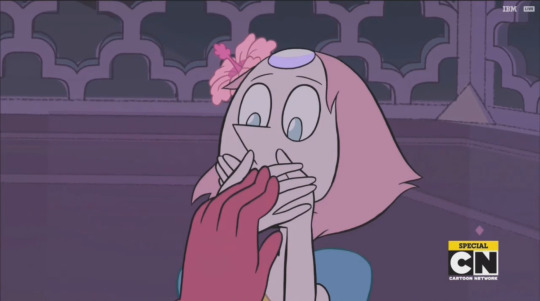
Can this one simple phrase from Pink Diamond actually have locked away Pearl’s ability to even remotely talk about this? Intentionally or not?
She shows throughout the episode her wanting to talk about it to Steven, to tell him everything about it. Even at the very end of the episode where she tells Steven that she “wanted to tell” him for so long.
We know Pearls are designed to be subservient to their masters, and could this have been a part of Pearl’s programming as a “gem” to listen and obey their masters? Whether or not she truly loved Rose, whether or not she truly believed in the rebellion against the Diamonds.
How much of what has been done has been of Pearl’s own free will and not because of the Diamond she is attached to?
I believe of her own free will, she genuinely fell in love with Rose. There’s no denying that. Her emotions were genuine and real just like Greg’s, we see that in her opening herself up to Greg.
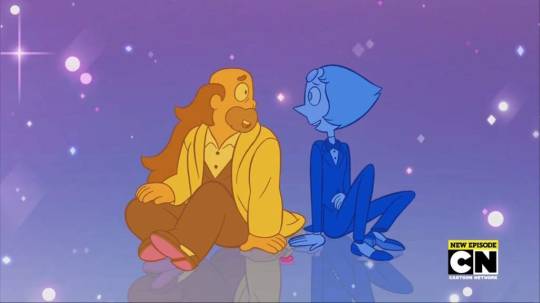
Of her own free will, she has grown an attraction to the Mystery Girl.
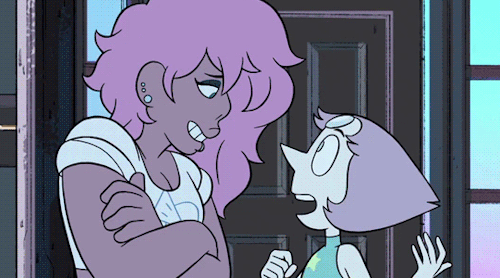
Pearl like everyone else can love, can grow, can feel emotion. She’s not just a “subservient Pearl to do whatever she wants for her master”, she is unique, she is herself. And she’s probably one of the most tortured character mentally due to everything that has occurred.
But this one thing, the last thing her master, her diamond gave to her... She wasn’t ever able to talk about it. Not even really to Rose, especially not anymore.
Though... I also don’t think Rose really intended for her to be bound by that promise, if she was really bound by force to never speak of that.
Personally when it’s all said and done, I don’t think Pink is inherently a bad person. I think she made a lot of poor decisions, but, I think she’s incredibly “human” for that as well.
The mistakes Pink Diamond has made, many of which are unforgivable, but in the time of war can and have to be made in the spur of the moment.
In a lot of respects the idea of the rebellion being led by that of another Gem is much more powerful then of a Diamond splitting off from her sisters. It’s more inspiring and really goes to show that there’s power within the people, not within just a singular person.
And even if Rose was actually that one person, there’s plenty other examples of characters being able to hold their ground to that level, at least to an extent.
Pink was genuinely terrified enough of Bismuth’s weapon that she bubbled her away (that not also including that she knows Rose’s sword was designed not to be able to shatter, so she could easily see through Rose and Pearl’s plans).
I think when it’s all said and done. Steven Universe is probably one of the deepest cartoons out there. There’s so many levels of questions, theories, and possibilities it’s amazing. And I can’t think of a cast of characters so well developed, so thriving with personality and raw emotion then this show here.
I guess what I’m getting at is in a TL:DR sorta way is:
•How “programmed” are the gems to their tasks and what they do? Is it physically programmed into them or is it “mentally” like being taught from birth that they have to think and act this way.
•What are the Diamond’s motives?
•Who is White Diamond?
•And are Yellow and Blue subservient to White? And if so...? What is the ultimate goal for Homeworld, what they’re really after.
•And Pink is a bad person, but their mistakes fall into the gray area. And that doesn’t make her irredeemable. At least, I don’t think so.
I can’t believe this show has captured me so much that I spent nearly two hours writing this entire thing up. I have no regrets and I love it.
And I’d also love to hear your opinions on this too ^^
#steven universe#spoilers#spoiler#Questions#theory#ramblings from shower thoughts#sapphire#pearl#garnet#pink diamond#white diamond#yellow diamond#blue diamond
2 notes
·
View notes
Photo

F : FLIRT. IS YOUR MUSE GOOD AT FLIRTING? HOW DO THEY FLIRT?
Okay so this one is just a massive can of worms. So. Amos has a tendency to come across as just. The brute. The muscle, the brawn, the guy that beats people up, shoots people, with ‘just’ the secondary keep the ship running purpose. There’s a few things I’m going to address. This might get super long, sorry in advance (I guess). Amos is happy to let people assume that. It generally works in his benefit. Keeps him out of the limelight. Keeps him from having to make the tough calls. Pretty much guarantees that everyone will underestimate him which is an advantage in pretty much every situation.
The truth of the matter is, Amos is: extremely observant, intelligent, capable and very good at reading the room, reading people, understanding people’s motivations and seeing through almost anybody’s bullshit and pretenses. He can fix anything and everything on the Cant and, when something goes wrong with the Roci in the show, even with it being advanced tech in comparison to Earth’s tech and the Cant, he knows exactly what needs done to fix it. He knows how to manipulate the scientist into talking. He runs quantum mathematics in his head. (Yes, Naomi does it faster but he’s still doing that math, in his head.)
He lacks an accurate moral compass. He lacks an intricate understanding of human / social interactions. He lacks the ability to feel fear. He lacks empathy in most instances. He lacks conscience in most instances. He is not, however, stupid. He is not just brawn. He is not cruel. He is not without regret or compassion. He could be extremely manipulative. He could control situations and people around him to benefit him in a lot of ways, in a lot of situations, and he chooses not to because he doesn’t want to be the bad guy, he doesn’t want to be the asshole, and above all else he respects people’s ability and right to make their own choices. For better or worse.
There are at least two instances that we see Amos be charming, or flirtatious, and exuding sexual energy and charisma in the show. They are both brief. They are tiny moments, one of them is barely a few seconds. He is fully capable of being seductive, of being charming, of using his magnetism and sexual prowess and physical strength and looks to his advantage. He doesn’t. He doesn’t want to. He doesn’t want to coerce other people, manipulate people, in any way that ties in to sexuality or preying on people’s emotions because he knows what it feels like to be on the other side of that. And he isn’t that guy.
Violence? Sure. Violence is simple, it’s basic, it’s primary. There’s no subterfuge in that.
So yeah. He can flirt. And he’s really fucking good at it. He knows how to read people, how to play off their insecurities and their interests, and how to use touches and proximity and primal needs to work someone up. And in romantic relationships where they are already built on a precedent of trust and emotional involvement, it becomes a slow and gradual part of the back and forth. But it isn’t what it’s built on.
Also, for the main point of reference in terms of seeing him in action check out THIS GIF SET.
0 notes
Text
The Sailor Moon paper I wrote for my gender studies class
Last week, I mentioned the presentation I did on Sailor Moon for my gender studies class, and how my professor was so impressed by Sailor Moon’s themes that she told me she wants to show it to her kids. Anyway, I promised that I would post the paper the presentation focused on once I finished writing it, so here it is!
I drew quite a bit from a previous paper I wrote on Sailor Moon, but I also included a lot of new things. Particularly, I added sections on how femininity is often negatively portrayed in the media, Haruka’s gender nonconformity in the manga, and the presence of the Outer family.
Bishoujo Senshi Sailor Moon
It seems as though more and more frequently, the lack of female-centric media is being called into question. It appears as though the majority of movies, tv shows, and other media feature a male protagonist, with female characters being relegated to the sidelines. Even if there is a female protagonist, it often feels like she doesn’t get to develop strong relationships with other female characters. The lack of deep female relationships and overall female representation in media is indeed unacceptable; the same can be said for the lack of representation regarding LGBT people. However, I feel as though we should praise a particular series that not only delivers on those things, but proves that doing so can lead to massive success. It’s called Sailor Moon (known as Bishoujo Senshi Sailor Moon in its native country of Japan), an anime (cartoon) and manga (comic book) series aimed at girls. Sailor Moon is so impressive because it provides positive portrayals of femininity, female relationships (both platonic and romantic), gender nonconformity, and even non-traditional families.
Bishoujo Senshi Sailor Moon, which means “Beautiful Soldier Sailor Moon” in Japanese, was created by a female Japanese mangaka, or manga artist, named Naoko Takeuchi. The manga debuted in the girls’ magazine Nakayoshi on December 28, 1991 and ended on February 3, 1997; the animated adaptation premiered on March 7, 1992 and ended February 8, 1997. From the very beginning, Sailor Moon was a smash hit; originally intended to only consist of a single arc, its popularity caused Takeuchi to expand it to five arcs. In addition to the original anime and manga, Sailor Moon’s enormous popularity has resulted in, as of 2017: A series of stage musicals, 31 in all; three movies with theatrical releases; a live-action series that comprised of 52 episodes; numerous rereleases of the manga and anime; many video game spinoffs; many foreign-language dubs; and finally, a new, updated anime reboot entitled Sailor Moon Crystal that is ongoing.
Sailor Moon revolves around an ordinary 14-year-old girl named Usagi Tsukino who befriends Luna, a mysterious talking cat who gives her a magical brooch. After saying a transformation phrase, the brooch enables her to transform into Sailor Moon, a beautiful soldier who fights against evil and protects good. Usagi and Luna must work together to find both the Legendary Silver Crystal, an artifact of enormous power that the antagonists are also searching for so they can conquer the world, and the missing Moon Princess, who can use the Silver Crystal for the sake of good as her birthright.
Along the way, Usagi makes friends and allies who assist her in her mission. The first is the studious and shy Ami Mizuno, who becomes Sailor Mercury. The two later meet a fiery shrine maiden named Rei Hino, who awakens as Sailor Mars. After a period of the three fighting alone, they meet the strong yet sensitive transfer student named Makoto Kino, who becomes Sailor Jupiter. Finally, they encounter a bubbly aspiring idol singer named Minako Aino, who had already awoken as Sailor Venus and later joins the team with her own cat, Artemis. Together, they’re known as the Sailor Soldiers (or Sailor Scouts, popularized by the English dub of the series). Usagi also meets and falls in love with Mamoru Chiba, a high-school student who assists the Sailor Soldiers as the mysterious Tuxedo Mask. It’s eventually revealed that Usagi herself is the reborn Moon Princess, Serenity, and Mamoru is her lover from her past life, Endymion.
The series goes on for four more arcs, although the basic premise of the Sailor Soldiers fighting against evil always remains. Within the second and third story arcs, five more Sailor Soldiers are introduced. Chibiusa, Sailor Moon’s daughter from the distant future who travelled back to the past in order to train alongside her mother’s past self as Sailor Chibi (which means “small”) Moon; world-class violinist and artist Michiru Kaioh, who can transform into Sailor Neptune; famous racer and notorious flirt Haruka Tenoh, who becomes Sailor Uranus; Sailor Pluto, an immortal goddess who was originally the guardian of time but later became a human named Setsuna Meioh; and finally Hotaru Tomoe, a chronically ill and misunderstood girl who later becomes the dreaded Sailor Saturn.
These characters are what Sailor Moon can attribute its phenomenal success to, as well as its overall themes of female empowerment and optimism. Before Sailor Moon and, indeed, to this day, superheroes are predominantly male and geared towards a male audience. Not only that, women and girls are underrepresented in entertainment media as a whole and femininity is often portrayed as weak (or at least weaker than masculinity). Traits and qualities that are usually associated with women and femininity are often devalued, scoffed at, or are, again, at least portrayed as being weaker than qualities associated with men and masculinity. These feminine, so-called “weak” qualities include cooperation, mutuality, equality, sharing, empathy, compassion, caring, vulnerability, a readiness to negotiate and compromise, emotional expressiveness, and intuitive and other nonlinear ways of thinking (Johnson 7).
Moreover, female characters are usually less multidimensional than male characters. The documentary Miss Representation examines this lack of representation and how girls and young women in particular are affected by it. The documentary argues that, because media propagates such limiting portrayals of women, teenage girls are left feeling powerless and unrepresented. And it’s not hard to understand why that is. As Miss Representation demonstrates, women are rarely the main protagonists in films and tv shows. When they are the protagonists, their stories are rarely about finding one’s destiny or saving the world the way it is for male protagonists. Adding insult to injury, even if women are action heroes, they are usually hyper-sexualized. Femininity is limited to its sexual aspects for the benefit of male viewers.
With all of this in mind, it becomes apparent just how much of a game-changer Sailor Moon herself was. In her article “Sailor Moon: Japanese Superheroes for Global Girls,” Anne Allison elaborates on this concept:
Sailor Moon is popular for both the female and superhero parts of her character. As such, she is something of a hybrid, embodying conventions both of boys’ culture- fighting, warriorship, superheroes- and shoujo (girls’) culture- romance, friendship, and appearance… The show’s creators have merged two features that have traditionally been kept fairly distinct; the masculinity of a fighter and the femininity of a romantic…. Sailor Moon is a warrior who retains, rather than revokes or transcends, her femaleness. (273) Not only is Sailor Moon a warrior who fights against evil alongside her teammates, she’s also a beautiful, sensitive girl who dreams of romance and shares close, loving relationships with her family and friends. Although Usagi becomes much more focused and determined after she transforms into Sailor Moon, her femininity is still readily apparent.
This weaponization of femininity is most apparent in Sailor Moon’s attacks. Her most powerful weapon is the Silver Crystal, which often emits sparkles and pink bursts of light when in use. Sailor Moon also uses pink, ornate magic wands to utilize her attacks, which present themselves as hearts made of pink energy, bursts of rainbow colors, and sparkly feathers. Sailor Moon may be a warrior, but she doesn’t fight like a conventional one. In fact, instead of beating enemies into submission, she prefers to love and heal them instead. One of the major themes of the show is that Usagi’s unparalleled ability to love and forgive is her true strength and the source of her power. In fact, in the very last episode (“Usagi's Love! Moonlight Illuminates the Galaxy”), Usagi redeems the final arc’s main antagonist by appealing to the goodness that remained in her heart instead of just killing her. All of these traits are associated with traditional femininity.
All of these traits associated with Sailor Moon immediately endeared her to a wide audience. She instantly connected with Japanese schoolgirls in particular, in large part because of her approachability. The “Sailor” part of Sailor Moon comes from the fact that the Sailor Soldiers fight in modified versions of sailor fuku (also known as seifuku), or school uniforms that are based on naval suits. The majority of Japanese middle and high schools implement sailor fuku as uniforms, so Japanese schoolgirls were able to easily relate to the Sailor Soldiers and were excited to see girls who looked just like them fighting as heroes (Choo 279). Sailor Moon’s approachability is not limited to appearances, which is what allowed the series to connect to millions of people worldwide. Each of the ten Sailor Soldiers are completely unique and have their own personalities, interests, strengths, and weaknesses. The cast is so varied it’s guaranteed that almost anyone who watches the series will find at least one role model or a character to look up to. Instead of struggling to find a female character to connect with, viewers were now presented with ten to choose from.
Additionally, Sailor Moon became so popular because it completely reinvented the magical girl (or mahou shoujo) genre. Before Sailor Moon, most magical girls only used their powers for mundane or personal purposes. Sailor Moon introduced the concept of a magical girl warrior, a mix of traditional magical girl elements and sentai (Japanese-style superheroes, such as the Power Rangers) action. What resulted was a type of magical girl who used her powers to actively fight against evil. Not only did the Sailor Soldiers have flashy, pretty transformation sequences and wear cute, feminine uniforms like the protagonists from previous magical girl series, they fought like the Power Rangers. This hybrid magical girl/sentai style became enormously popular and soon other series began trying to emulate Sailor Moon’s success (Allison 262-267, 272-274).
Furthermore, Sailor Moon provides a wide array of strong female relationships, both platonic and romantic. What we typically think of women’s experiences in friendships and women's virtues- emotional expressiveness, dependency, the ability to nurture, intimacy, and so on- are prominently featured and celebrated in the series (Kimmel 375). In fact, the friendships that the Sailor Soldiers share with one another- specifically, the friendships between the five original girls who are collectively known as the Inner Soldiers- is one of the main themes of the series. They aren’t just teammates who support each other in battle; in fact, much of the series’ screen time is devoted to the girls’ everyday lives as they go to school, go shopping, study, and hang out together, just like ordinary friends.
The deep and intimate bonds of their friendship are shown in full in Sailor Moon R: The Movie, the series’ first theatrical release. Towards the end of the film, the main antagonist, Fiore, speaks of his loneliness; the Inner Soldiers (sans Usagi) all think of how they have also been lonely, shunned by their classmates for being different or strange. At the movie’s climax, in order thwart Fiore’s plot of sending an asteroid to hit Earth, Usagi is forced to use the full potential of the Silver Crystal; doing so is incredibly dangerous for her, as using too much of the Silver Crystal’s power exhausts one’s life force. The other Sailor Soldiers immediately rush to help her, resolving to combine their powers so they can all return to Earth together. As the girls join hands, they think of how much Usagi means to them, and how she saved them from their loneliness with her love and friendship. With her friends’ support, Usagi is able to destroy the asteroid before it hits Earth. The film makes it clear that the Sailor Soldiers’ bond with and devotion for one another is what makes them powerful. This is in stark contrast to the many movies and tv shows that depict women as natural enemies who compete with each other to be the most beautiful or to win the man (Miss Representation).
Platonic relationships aren’t the only kind featured in the series. In fact, Sailor Moon is significant for its prominent representation of LGBT people. Most notably, two of the Sailor Soldiers, Sailor Uranus and Sailor Neptune, are actually lovers who share a close, loving relationship. Within the series, their relationship is treated as something as something completely ordinary; their closeness is never questioned or objected to, and the other Sailor Soldiers sometimes comment on how perfect they look together. In one episode (“Episode 95: Let Moon Help With Your Love Problems”), they even enter a couple’s competition and blow everyone away. But what’s more important is that Haruka/Sailor Uranus and Michiru/Sailor Neptune are given ample characterization outside of simply being lesbians. Their sexualities, while part of who they are, don’t dominate their characterizations; in other words, they’re gay characters who are treated like normal people instead of stereotypes.
Aside from being a lesbian, Haruka/Sailor Uranus is also presented as gender-nonconforming in the manga. Haruka identifies as a woman, but her gender presentation often changes; she easily switches between pants and button-down shirts to short skirts and flowing blouses. At one point in the manga’s third arc (“Act 32: Three Soldiers”), Michiru/Sailor Neptune says “Uranus is like a man and a woman in one. She has the strengths of both genders; it is her special advantage as a soldier.” Michiru isn’t saying that Haruka is physically both male and female; she’s saying that Haruka does not choose to present as either totally masculine or totally feminine, but rather a combination of both. Haruka’s gender nonconformity isn’t portrayed as strange or off-putting; rather, it’s explicitly stated that it’s her strength as a Sailor Soldier. What’s more, nobody ever questions Haruka about her androgyny; rather, the other characters just accept it as a part of who she is. This portrayal is very admirable, especially considering how gender nonconformity is usually handled in media. As Leslie Feinberg explains, “Those of us who cross the ‘man-made’ boundaries of sex and gender run afoul of the law… We have grown up mostly unable to find ourselves represented in the dominant culture” (Feinberg 147). Although character like Haruka is unfortunately hard to find, at least she’s able to be a good representative for gender-nonconforming people.
Aside from all that, Sailor Moon even features a very positive portrayal of a non-traditional, lesbian family. This is significant, because as Stephanie Coontz explains, “For 150 years, the married-couple nuclear family based on male breadwinning and female domesticity has been the main set of instructions on how we should organize adult sexual relationships, raise children, and meet interpersonal obligations” (118). When people- especially LGBT people- attempt to deviate from this familial norm, many immediately protest it; they do so because they argue that children raised by gay or lesbian parents will be not be as healthy as children raised by heterosexual parents (Kimmel 183-184). In reality, however, gay and lesbian couples provide a model of family life in many cases. For example, homosexual couples are more likely than heterosexual couples to share housework and child-rearing responsibilities (Kimmel 185). Moreover, research shows that the children of same-sex parents are just as emotionally healthy, and as educationally and socially successful, as the children raised by heterosexual parents (Kimmel 186). It’s the quality of person’s parenting, rather than their sexuality, which determines how well a child will develop.
In the final chapter (“Act 38: Beginning a Journey”) of Sailor Moon’s third manga arc, Sailor Saturn exhausts her powers and is reborn as a baby. Because she has no family, Sailor Uranus, Sailor Neptune, and Sailor Pluto decide to adopt and raise her. Several chapters later (“Act 44: New Soldiers’ Dream”), we see that Haruka, Michiru, Setsuna, and Hotaru (the reborn Saturn) have formed a loving, stable, and healthy family. Hotaru (who by now is a young child, as her powers have caused her to age at an accelerated rate) refers to Michiru and Setsuna as her “Mamas,” while she calls Haruka “Papa” due to her more masculine appearance. The manga also states Haruka, Michiru, and Setsuna all share the housework and child-rearing responsibilities; in fact, all three of them wear promise rings to symbolize their dedication to raising Hotaru and being good parents to her. Thanks to their love and support, Hotaru grows up to be a much happier, more outgoing, and stabler girl than she was in her previous life. Just like real-life research indicates, Haruka, Michiru, and Setsuna’s gender and sexuality did not negatively impact their ability to raise Hotaru. All that mattered was the quality of their parenting.
For all these reasons and more, it’s easy to see why Sailor Moon is such a beloved series. It brought audiences what they sorely needed: Strong and brave, yet relatable, female superheroes who encouraged them to be themselves and provided something to aspire towards. Moreover, it provided positive representation for LGBT people (including gender-nonconforming people) and even debunked stereotypes about them, such as the idea that same-sex couples cannot properly raise a child. The series also provides a healthy view of female friendships. Rather than portraying the Sailor Soldiers as rivals or making their relationships with each other shallow and insignificant, the series consistently characterizes their relationships as strong, meaningful, and loving. When keeping all of that in mind, it becomes clear that the series is just as relevant and needed in 2017 as it was back in 1992. Its themes of love, friendship, hope, and female empowerment will always be needed by not only girls, but by boys and adults as well.
Works Cited
Allison, Anne. "Sailor Moon: Japanese Superheroes for Global Girls." Japan Pop! Inside the World of Japanese Popular Culture. New York City: M.E. Sharpe, 2000. 259-78. Print.
Choo, Kukhee. "Girls Return Home: Portrayal of Femininity in Popular Japanese Girls’ Manga and Anime Texts during the 1990s in Hana Yori Dango and Fruits Basket." Women: A Cultural Review 19.3 (2008): 275-96. Web. 28 Apr. 2017.
Coontz, Stephanie. "How Holding on to Tradition Sets Families Back." The Way We Really Are: Coming to Terms with America's Changing Families. New York City: Basic Books, 1997. 109-22. Print.
Feinberg, Leslie. "To Be or Not to Be." Women’s Voices, Feminist Visions: Classic and Contemporary Readings. 2nd ed. Boston: McGraw Hill, 2004. 147-50. Print.
Johnson, Allan G. "Where Are We?" The Gender Knot: Unraveling Our Patriarchal Legacy. 3rd ed. Philadelphia: Temple University Press, 2014. 3-25. Print.
Kimmel, Michael. The Gendered Society. 6th ed. New York City: Oxford U Press, 2017. Print.
Miss Representation. Dir. Jennifer Siebel Newsom. OWN: The Oprah Winfrey Network, 2011. Netflix. Web. 28 Apr. 2017
772 notes
·
View notes
Photo
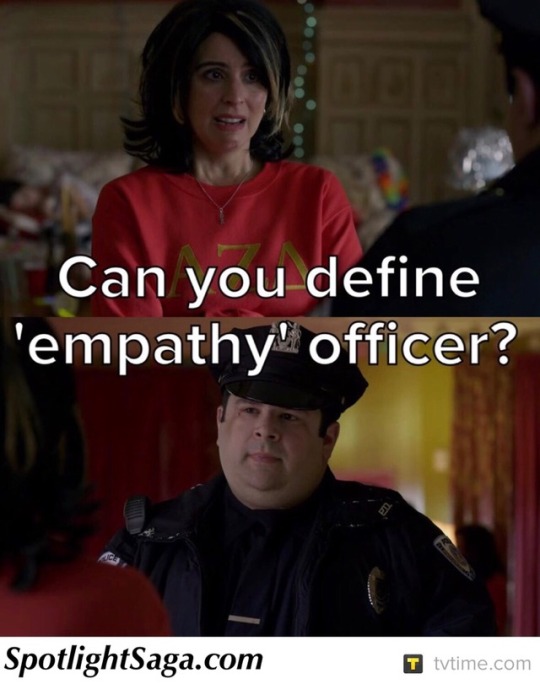
Kevin Cage of @spotlightsaga reviews... Orange is the New Black (S05E03) Pissters! Airdate: June 9, 2017 @oitnb Ratings: @netflix Streaming Only Score: 8.5/10 **********SPOILERS BELOW********** What's the worst thing YOU'VE ever done? Not an easy question... However, It's not really the answer that truly matters... It's how you feel about the answer, that's assuming the answer is even true. Because the ability to learn and grow and taking the chance to NOT be 'cruel to something helpless and weak' in the future is what really matters. It's a bit of human nature to block traumatic events out in some way or form, or just pretend they never happened, but there are many that fight that nature... Just like we fight our primal, animalistic urges and thoughts that randomly pop up in our heads on a daily basis, many many times! Believe it or not, there are many that even refuse to acknowledge that those urges or thoughts exist... But we are human, which means we are flawed... Animals pretending and doing the best they can to act in a civilized manner. What separates us from other animals, or even some people, is empathy. Empathy is powerful tool and it basically boils down to a trait that is truly learned. Some of us may be born with a massive empathetic radar, but it has to be honed, it has to be guided in the right direction from the time you are child, through your teens, to your 'oh, so fucking difficult' 20's (is anyone else who's survived their 20's with me on this one?)! Remorse and empathy go hand in hand... Cause, effect... And whether you truly are able to put your self in someone else's shoes and understand not only how they feel, but why they feel it, the weight of their emotional experiences... You can't just feel sorry for someone and their suffering (that's sympathy), you have to be able transcend, almost astral project from your body into another's and live in its space. That is empathy. After 4 entire seasons, and a few episodes into the 5th, there are many characters that we can easily identify as human beings who are truly remorseful for the things they've done and who is feeling sorry for themselves because they've gotten caught. This is what makes Linda Ferguson (Beth Dover) such a welcome and fascinating character to explore and watch adapt to her new environment. She's timid at first, but she's fitting in rather quickly... No one really seems to be questioning her, and the producers at Lucky 8 who create the AETV tv series '60 Days In' should really take notes 'cause THIS is a backstory... 'The Counterfeit Cunt of Connecticut!' The Connecticunt of Litchfield Prison! Looking over a lot of the 'per usual' ridiculous, uninspiring commenters who lack true perspective in psychology, sociology, or just real life street knowledge over at Internet Mags like 'AV Club'; lots of viewers had a problem with this Linda flashback. I loved it. Here is a woman, who has found herself in a fucked up predicament. She technically shouldn't be in Litchfield, let alone posing as inmate, but she's doing what she has to do to survive. Her backstory reveals that she really is the monster that we all thought her to be... The one who pulls out guns on concerned family members that have been locked away and forgotten in MAX, the one that was the epitome of a sorority stereotype, the one who is the direct result of the ALPHA of all ALPHAS, one that let a clearly overly intoxicated and alcohol poisoned 'sister' freeze out in the cold (as she furthered her social agenda)... TO DEATH. And did she show remorse, empathy, or even an ounce of sympathy? Oh no. Far from it, actually... She not only put on a show and manipulated an officer who should have been investigating a suspicious death, but she took the girls place as once again... The ALPHA of all ALPHAS! Linda might not be in Litchfield serving an actual sentence, but the 'worst thing she's ever done' is actually far worse than many of the stories of inmates we've seen that have come before, ones that are followed by conflicted feeling of guilt and real remorse. That's not something that lives inside Linda. That juxtaposition alone justifies the campy and familiar, almost 'Scream Queens' like way the her Sorority Flashback story was told. Rebecca Angelo & Lauren Schuker Blum meant what they wrote and Phil Abraham did an excellent job bringing their writing and Jenji Kohan's vision onto the screen for us in the directors chair. What's not to get? Sometimes the obvious route is the best route to take... Certainly still gets you where you need to go. Now, theres no denying there have been a fair share of liberties taken to move the core narrative along, but that's to be expected. Essentially OITNB5 is moving in real time, everything seems to be running in an almost 24-like style. This is a refreshing change for OITNB and ultimately opening up possibilities for a multitude of different styles of storytelling the likes the show has never seen before. There was a lot of talk about demands... And the women were able to work together to actually put a cohesive list of 'mostly' fair and sane demands up for the few outside to see... The most important being amnesty, although you can't trust anyone making promises to inmates to quell a literal prison takeover. Taystee (Danielle Brooks) has a particularly hard time with understanding her fellow inmates... She can't fathom why justice for Poussey (Samira Wiley) isn't at the top of the demands list, actually falling to Number 9, giving the show another way to explore human empathy and the lack thereof. Either way Red (Kate Mulgrew) and Blanca (Laura Gomez) are working hard to gain some sort of leverage over Piscatella (Brad William Henke). This will hopefully work out in the women's favor due to their hard work, frantically searching through file after file attempting to dig up dirt and connect a tattoo that Red noticed on Piscatella's wrist to his past. Did I mention there was speed involved? Ah yes, gotta have our humor mixed in with our heaviness in OITNB. We're still tumbling forward at the fastest pace we've ever seen OITNB charge ahead before. I'm like a kid in a candy store... The core narrative is already firmly established and subplots are literally peaking down on inmates from the ceiling like Coates (James McMenamin) watching Pensatucky (Taryn Manning) use a cellphone as a vibrator. Yeah, that's a lot to take in. If you thought Coates was creepy before, this is a whole new ballgame. Get it going, now... This is just episode 3 and we thankfully have 10 more glorious episodes that could literally take us anywhere, to go!
8 notes
·
View notes
Photo

@anonymous sent in this headcanon / valentine’s day meme!
F : FLIRT. is your muse good at flirting? how do they flirt?
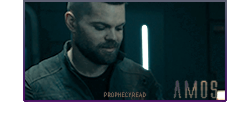
Okay so this one is just a massive can of worms. So. Amos has a tendency to come across as just. The brute. The muscle, the brawn, the guy that beats people up, shoots people, with ‘just’ the secondary keep the ship running purpose. There’s a few things I’m going to address. This might get super long, sorry in advance (I guess). Amos is happy to let people assume that. It generally works in his benefit. Keeps him out of the limelight. Keeps him from having to make the tough calls. Pretty much guarantees that everyone will underestimate him which is an advantage in pretty much every situation.
The truth of the matter is, Amos is: extremely observant, intelligent, capable and very good at reading the room, reading people, understanding people’s motivations and seeing through almost anybody’s bullshit and pretenses. He can fix anything and everything on the Cant and, when something goes wrong with the Roci in the show, even with it being advanced tech in comparison to Earth’s tech and the Cant, he knows exactly what needs done to fix it. He knows how to manipulate the scientist into talking. He runs quantum mathematics in his head. (Yes, Naomi does it faster but he’s still doing that math, in his head.)
He lacks an accurate moral compass. He lacks an intricate understanding of human / social interactions. He lacks the ability to feel fear. He lacks empathy in most instances. He lacks conscience in most instances. He is not, however, stupid. He is not just brawn. He is not cruel. He is not without regret or compassion. He could be extremely manipulative. He could control situations and people around him to benefit him in a lot of ways, in a lot of situations, and he chooses not to because he doesn’t want to be the bad guy, he doesn’t want to be the asshole, and above all else he respects people’s ability and right to make their own choices. For better or worse.
There are at least two instances that we see Amos be charming, or flirtatious, and exuding sexual energy and charisma in the show. They are both brief. They are tiny moments, one of them is barely a few seconds. He is fully capable of being seductive, of being charming, of using his magnetism and sexual prowess and physical strength and looks to his advantage. He doesn’t. He doesn’t want to. He doesn’t want to coerce other people, manipulate people, in any way that ties in to sexuality or preying on people’s emotions because he knows what it feels like to be on the other side of that. And he isn’t that guy.
Violence? Sure. Violence is simple, it’s basic, it’s primary. There’s no subterfuge in that.
So yeah. He can flirt. And he’s really fucking good at it. He knows how to read people, how to play off their insecurities and their interests, and how to use touches and proximity and primal needs to work someone up. And in romantic relationships where they are already built on a precedent of trust and emotional involvement, it becomes a slow and gradual part of the back and forth. But it isn’t what it’s built on.
Also, for the main point of reference in terms of seeing him in action check out THIS GIF SET. I plan on compiling a gifset of my own of those few moments in the show where it’s shown, if you are paying attention, but they are super brief and fly by, which is, in my opinion, the point.
#headcanon. ( amos burton. )#HEADCANON.#anonymous#headcanon. ( please do not reblog. )#DO NOT REBLOG. ( unless you are tagged in this post. )
1 note
·
View note
Text
BYOBS, direct consumer marketing
Disclaimer, the post below are insights from: https://www.parkerwhite.com/insights/direct-consumer-marketing-campaign/
Recap of the previous blog: On the past blog, blog#2 I posted my three fundamental motto to abide Building Your Own Business with you Sibling. Namely, (1) Establish honestly and clearly each other’s focus; (2) See your sibling from a different angle; (3) Family first or Company first dilemma? Plan for ‘it’ first. While the title of each section are self explanatory, my longer summary is as follows: Be there for each other, knowing honestly what the other person can do, should do; (2) Welcome the new perspective of the sibling so they can be authentic, and along the way, you, yourself, be authentic about who you are; (3) Set up the basic goal/premise of what is your perspective in this company. For me, it is family first, until we have a scale, and it will be Company first.
For my blog post #3, I have set up with my sister my responsibilities in marketing. If it’s direct to consumer, Eleanore will take care, and if it is wholesale or B2B, I will take care. Even so, I begun to write about DTC (direct to consumer) and its pros and con, just to learn about business, and that crucial section of the business planMy post was verbose and lacking depth. My notes and writing could not compare to the post by Parker written on 2/23/17. So, this repost shall serve my intentions for now.
----- beginning of post by Parker -----
3 Tips For A More Effective Direct To Consumer Marketing Campaign February 23, 2017/in Email Marketing, Marketing Strategy /by Ryan Parker
To understand which approach works best, we must first ask the question: What is a direct to consumer marketing campaign? A direct to consumer (DTC) campaign involves promoting a product or service directly from the seller to consumer, cutting out any middle man along the way, allowing the brand to build a direct relationship with their customers.
For many companies direct to consumer marketing strategy has become much more of a necessity rather than a luxury. Massive research and development costs coupled with an increasingly competitive marketplace have forced companies to spend enormous sums of money on promotion to quickly gain market shares before patents expire or competitors arise. However, large commercial campaigns shouting to a broad demographic are no longer effective. Direct to consumer marketing campaigns need to align within the boundaries of today’s consumer run marketplace by developing compelling brand experiences across all touchpoints.
Here are 3 tips for a more effective direct to consumer (DTC) marketing campaign strategy.
Empowering Consumers
For good, or for bad, the Internet and its massive wealth of information has shifted the balance of powers between brands and consumers. Consumers are no longer willing to be passive recipients of marketed advertisements. Recent market research shows a clear trend that customers are not only trusting traditional advertising less, they’re actually putting more importance on information from other consumers, be it a family member or a customer review from a stranger on the Internet. (Nielsen, 2015).
As outdated advertising tactics bow to the modern consumer’s buying habits, brands are being forced to become transparent with their products and advertising initiatives to the point where they are even empowering consumers to impact marketing decisions. Crowdsourcing, co-creation, and brand communities are increasingly becoming the most powerful tools marketers are using in their arsenal to strengthen the bond between consumers and the brand.
How to empower your consumer engagement:
Involve current customers in product development and testing.
Engage customers to create something for the brand. (Creating an advertising slogan or new product)
Setup a platform for consumers to voice their opinions about changes and/or additions they might have for your product.
Give your customers a few marketing options and let them select an option to be used by the brand.
Empowering customers to impact marketing initiatives creates a direct connection from your brand to the consumer. Not only do they end up spending more time thinking about your brand, they build a relationship to it, single handedly creating brand ambassadors and word of mouth diplomats.
Native Ads Work Better
The growing use of ad blockers across every digital platform has posed an increasing challenge for brands seeking to reach online audiences. However, a recent study by the Association of Online Publishers (AOP) has proven that native ads on premium content websites are a powerful format, as they are more accepted and trusted by consumers when compared to traditional ads.
What exactly are native ads? In-stream ads, branded content and paid search can be considered variations of native ads, however, the term is more closely associated with brand-funded content, which is advertised by third-party publishers. BuzzFeed and Huffington Post are both good examples of websites showcasing native ads efficiently. Their posts look identical to the native ads they are publishing, minus a small note indicating that it is sponsored by the brand and not endorsed by BuzzFeed or Huffington Post.
While native advertising is a good way to keep readers attention, it’s important to match content with context, maximize engagement, and ultimately to create a mutually beneficial value exchange between the advertiser and consumer.
How to ensure your native ads reach their full potential:
Select the right platforms to ensure you’re reaching your consumers where they hang out.
Personalize the content to the viewer.
Optimize for multiple devices, especially mobile.
Authentic brands prevail. Be overly transparent. Make sure your viewer knows this ad is sponsored content. Transparency will always lead to better results.
Context and content must always be aligned for the ad and ensuing landing page.
The average individual is exposed to over 5,000 messages a day. The modern consumer has become savvier at tuning your brands message out. Native ads are a direct response to this clutter, and when done right, allow your messages to go from pushing content onto your consumers, to pulling them in.
Building Brand Awareness
For any company, the single key element of success besides efficacy, cost, and accessibility, is effective brand building. Building a brand is much like building a relationship with new acquaintances. It is not about becoming best friends overnight, or in the brand’s case, securing the sale immediately. Rather, it’s about building a meaningful relationship with those individuals through many light interactions over time. Unique experiences and interactions, founded on human understanding and empathy is how you build trust. It’s how you turn acquaintances into friends, and it’s how modern brands build emotional relationships with their consumers.
The only way to become unique in today’s competitive landscape is through a brand strategythat builds your brand into a living breathing entity, one with personality, values, and traits, in addition to being recognizable and memorable. It should be known that brand building is a long-term process, if you think that loyalty and brand affinity can be built quickly, you are already drifting into sales promotion tactics, not strategy.
Ideas to help aid in brand growth:
Build inspiring stories and deliver compelling experiences to match. (The age of personalization should not alter the focus of marketers to grow the brand)
Make sure your brand is consistent across all digital and non-digital touchpoints. (Your consumers should be able to remove the logo and still be able to tell whose product they are looking at)
Brands must focus less on personalized messaging and more on truly understanding personal patterns and context.
Transform your product from being a commodity into something that has a life of its own.
Whatever your customer journey might be, the path to purchase should be a branded experience. (Be it learning about the history and craftsmanship, or engaging with the brand through play, humor or interrogation)
Engage with customers as often as they desire, offering opportunities other than financial transactions to interact and engage with the brand.
Ultimately brands must become masters in the language of seduction. They must understand that creating desire is the single key element to being successful. The best brand building tactics create an urge deep within the minds of their consumers, the worst tactics instead, simply urge their consumers to buy from them.
Check out our DTC awareness campaign case study below, to see how we designed a strategy to increase sales by empowering consumers to take charge. Need help with your direct to consumer marketing strategy? Check out ParkerWhite’s San Diego marketing services.
---- end of the post by Parker ----
I kept all the links to the other website, out of respect, and out of my wish to keep additional useful knowledge for whomever follows my blog.
-maisonkuo
#byobs#huffingtonpost#buzzfeed#marketing#strategies#directtoconsumer#Brand#brandawareness#stories#createdesire#email marketing#business plan#entrepreneur#success#advertising#customer#advertisement#funnel#consumer#crowdsourcing
0 notes
Text
Autism Spectrum Discourse (ASD)
I’ve been exploring the possibility that I am on the autism spectrum. It’s something that came out of the blue, in a discussion with a close friend about her break-up, and the trouble her boyfriend had in relating to her on a human level. His lack of empathy, in particular. We fancifully speculated that the Jewish relation to autism is marked because of circumcision. And that, later, led me down the rabbit-hole of investigation to see if there was any truth to it.
Turns out there is a paper or two claiming a relation. But there are many opponents of those studies. Yet in all my investigations I came to find more and more signs that I may well be on the spectrum myself. While I had investigated previously, I think I had dismissed the likelihood because I am clearly not a low-functioning autistic person. I’ve never had the need to be cared for or have somebody handle some of my basic life functions. That said, I have struggled with many things.
The most crucial grounds for believing I may be on the spectrum is that in my teens and 20s, especially, I undertook massive self-directed study into how to become more social. I was a an uber-nerd pre-puberty, with computer programming, astronomy, and music composition my prime interests. I wouldn’t read fiction, seeing it as a waste of valuable time that could be spent learning about ‘the world’.
Later, turning to graduate studies, it was cultural studies and especially semiotics that captured my imagination. Through these fields I believed, with great excitement, that I had discovered a vast and valauble key to unlock the mysteries of the social world. I literally believed I know had tools to access the ‘hidden codes’ that govern the world of meaning – and thus of the social. Structuralism appears ready-made for autistics, as it is an advanced intellectual way of processing what for many people is learned intuitively: the norms of the social-emotional.
And I distinctly modelled myself on individuals who were at ease, and successful, in the social world. This has helped me a great deal. To most people I apparently seem very at ease myself in the social world. Even the world of small-talk and around the more elusive codes of social interaction. I may even have developed a certain charm.
Yet all is not as it seems, perhaps. And underneath, the cost of this is that often I don’t really know how I feel or what I really think about something. I may show great empathy, but how much of this is authentic, and how much is an act because I believe, more intellectually than affectively, that the other person is owed empathy. I do it not spontaneously, but because to not do it would challenge my own self-belief as a socially successful person.
I will write more about this at a later point. Suffice to say, I am ‘dialectically’ interpreting my possible relationship to autism. That is, while I have become utterly convinced that I am an adult with high-functioning autism or what used to be known as Asperger’s, I am continually subjecting that interpretation to scrutiny.
The trickiest part about the interpretation or diagnosis is that it is a spectrum, and not exactly a linear spectrum either. There are no signature symptoms unique to autism spectrum disorder (ASD). A diagnosis, according to Tony Attwood, is approached by identifying a significant number of symptoms from a wide range. And while it may be genetic, with around 50% of direct family members being affected, not all family members have the same symptoms. They might have very different diagnostic profiles, yet it makes sense. Diagnosing an individual is a family-resemblance (of symptoms) and also involves a family-resemblance cross-checking with other members of that individual’s family. So it’s clear how easy it could be to make a premature diagnosis. Just as it’s clear how easy it might be to miss a diagnosis (as Tony Attwood did with his own son).
Upon becoming convinved I am on the spectrum, I became energised profoundly. It made just so much sense. But also, it relieved me of a lot of self-imposed guilt. It showed me that my failings are not moral, but medical. In discursive terms, I was developing a new discourse of self-identity that offered a new subject position.
This is always going to be an affectively intense process. Stepping into the ASD discourse energises me because it offers a new explanation/understanding of who I am, where I’ve come from, and where I’m going. It articulates my identity, my subject-position, in a new way. Especially compared to the former way. So, it stops seeing me as lazy and weak-willed and hedonistic, and re-articulates my challenges as medical rather than moral. It offers hope. It comes with a new objet z (a new blocking element) which is the disorder itself (as well as my ignorance of my affliction). In turn, it offers a new objet a.
Here, then, is an account of my normal discourse of self-identity, and then the emergent Asperger's discourse:
Discourse 1
I am a talented genius, underachiever due to drug and alcohol use. I have discovered exciting discourse theories and my analyses can help propel progressive movements. I will be successful, but I am saddled by guilt for underachieving. Success is defined as recognition, international travel, transcendence, social esteem and sexual/romantic fulfilment. There is – or has been – a puritanical vision of a healthy, sober me. The vision is oriented around a ‘return’ to the blessed, pure, innocent young kid I was. Everything would change if I could only give up the weekend binges. Which I simultaneously will - it's inevitable - but cannot. This narrative structure is classic objet a: you'll inevitably return to the primordial fullness but cannot.
The primary affects here are guilt but also a manic thrill when feeling confident. It's not avoidance that sends me to the bottle. It's celebration. It's my brimming confidence that I am indeed on the path to realising my vision.
The fantasy at the heart of the discourse is that the world will be changed entirely by my contribution. I may have been placed here by God. My life is necessary.
The ontological ground of this discourse is personal, spiritual journey.
Discourse 2
I am talented, but it is an Asperger’s talent. That is, a talent for non-social and the unambiguous. My sense of contribution and talent has been an arrogance and fantasy based way of coping with my ASD way of feeling different, not fitting in, not being recognised in the way I should be. Drugs have been a way of making socialising easier, managing anxiety, and are a symptom of ASD. They do hold me back, but they are not my primary blocker. They are a response to my primary blocker, the objet z of this discourse: the cognitive and emotional traits associated with ASD. My objet a in this discourse is not just achieving career success (now that I've worked out what's been holding me back), but full health and a vibrant social life too. I need to incorporate my ASD self with my modelled self, and find a fruitful blend.
Primary affects in Discourse 2 are stabilisation and renewed hope.
The fantasy of this discourse is one of total reconciliation, but especially reconciliation of identity, self-recognition. Total vision. Total identity. No more vague or slippery sense of who I am. The Asperger's knowledge, combined with my existing self-understanding, produces total self-enlightenment.
The ontological ground of this discourse is neuroscience and psychology: it it the very material brain (my brain, an Asperger's brain) that undergirds these assertions.
:::
The question is: there's never a simply pure reason for choosing a new identity. There must be an affective drive, and in this case, that is due to the frustration I've had not being able to break the cycle of addiction, and the growing signs that this is profoundly holding back my career.
Can this new identity, and the strategies and practices that flow from it prove productive?
I hope so. We shall have to see.
Watch this space!
0 notes
Text
The Recent Movie Round-up… Arrival (2015) and The Martian (2016)

Wow, it has been ages since my last review. Apologies, a lot has happened in the last few weeks, I got married for one, went on holiday to Italy, loads. I guess I’ll have to watch some Italy based movies to review to celebrate. Anyway, these are two movies I have been wanting to cover for a while…
I have been enjoying my recent tangent of looking at two films that have some significant connective tissue, either on a surface level or more deeply thematic. Luckily these movies connect on both of those levels! On the surface they are both Sci-fi movies about the possible dangers posed by space travel, that dig a little deeper into the experience than that would suggest. Here we go…
Arrival (2015)
Finally, a true Sci-Fi movie! Not a fast paced, colourful space action-adventure (although I welcome those as well) but a hedonistic, thematically rich piece about humanity. The premise is about how aliens have parked a couple of their ships in certain spots all over the earth. Without knowing what they want, the various governments of the world scramble to understand the ships’ purpose and provoke a reaction, either through communication or military action. Amy Adam’s language and translation specialist is brought in by the US government to establish a method of communication with the visitors.
youtube
This movie’s love of communication and language, as well as the barriers they create is woven all through the film. The other string to the story is the stories understanding of empathy, and both strings work together to push the story and characters forwards. We have the two sides of the same coin in the two main characters, played by Amy Adams (her best performance in any role I have seen her in) and Jeremy Renner (who is slightly less impressive in a role that is slightly underserved), one seeks to understand humanity through her understanding of languages, the other uses cold, hard data to approach a situation. However, both characters come to understand, work with and even come to love each other. The same themes are played out in the characters attempt to communicate with the ‘Heptapod’ aliens, once communication has been established and empathy has developed between the two species, Adam’s character is given insight (or enlightened) to the power the alien language holds and can complete her arc and save the day. Even the rewards for the main character’s understanding and empathy is itself understanding and empathy.
The dangers caused by the lack of those emotions (I guess they are emotions) are also made clear by the plot, on a micro and macro level… We see that abuse of communication and a lack of empathy, in the plot through the alarmist, xenophobic BS spewed from niche radio, can lead to misinformation and fear; pushing the young soldiers to explode a bomb in the alien ship, causing the death of Abbott. On a global scale, fear and aggression builds when China threatens to launch weapons at the alien crafts, causing all other nations to cut off shared communication with each other. The day is only saved when Adam’s character gains her enlightenment and uses it to appeal to the warhead brandishing Chinese General.
See… the central message for me was basically “through communication and empathy can we achieve enlightenment and mutual gain”, which is surprisingly Buddhist-like for a little sci-fi movie. What’s also interesting about this message are the times this film was released, and it feels very prescient considering the position the US, Europe and Russia find themselves. If I was to place this movie into my Empathy Tringle (which I think I did), I would definitely lean it towards the empathy and intellectual corners (which I think I didn’t?).
This movie is also famous for its central twist, seemingly Adam’s character lost her child to a disease in her past, memories of which trouble her through the present story. We find out at the end of the film that we are actually watching her future as she gains the ability to see all time at once from the Heptapod. She knows that her child will one day die, but she goes ahead anyway. The more I think of this thread, the less I think it is the core story thread with which the movie is built around, and more I think it is a (very, very clever) way to allow the audience to understand how the time bending abilities of the aliens work by planting the seed early…
Those are my thoughts on the major themes of the movie. It helps that it is backed up by the masterful direction of Denis Villeneuve; now entering the pantheon of our favourite movie directors since Enemy (fantastically mind bending) and Sicario (his virtuosic masterpiece). The foreboding alien-ness is perfectly captured by the director’s signature looming distance shots, while the realism is maintained by the desaturated and almost drab colour-palette, and finally the emotionality is captured by the all-round fantastic performances…
Even the designs of the aliens and their ships work to establish that sense of real-ness, uncertainty and foreboding. My only criticism would be that maybe the interiors of the alien ships were a bit too basic and derivative. reminiscent of the kind of alien ships in Ridley Scott’s movie of the same name (which is a fun connection considering the next movie in this review).
Other than that, Arrival easily earns its score of 90/100 (slightly low upon review now) and slots in at number 9 in the current list. It goes without saying that Villeneuve is our one to watch in future, and I’m looking forward to seeing what he can do with Blade Runner in the upcoming sequel (another Ridley Scott connection!)
The Martian (2016)
More connections! More connections! If Arrival is the story of how one person can use the power of communication to save the whole human race from oblivion (I’m generalising slightly but I think you know what I mean after what you’ve just read), then the Martian is the story of the whole human race using the power of communication to save one person from oblivion (sort of!).
Ok so, the basic premise, one extremely resourceful American Astronaut is stuck on Mars, and he has to use his own expertise and ingenuity to get back home. It’s a great premise, right? And (Matt) Damon’s character is extremely resourceful in getting himself back to good level of survival on his own after the disaster that left him stuck on Mars. He fixes his wounds, rations his food and even manages to extend his survival time by devising a plan to grow potatoes. The movie allows us to build empathy with him through his charming audio/video logs that go into some detail explaining how he is going to ‘science the shit’ out of his situation (by the way, the book the movie is based on goes into so much more detail on the science, believe me, I’ve read it 4 times…)
He basically becomes the Martian, scientific Robinson Crusoe; self-sustaining away from the larger community. However, the movie shows us that he can only get so far on his ingenuity alone. Only once his comrades at NASA realise he is alive and a communication begins between them can he be rescued.
youtube
The pure scientific glee at evolving communication between Mars and NASA can be seen in the moments of relief when the Discovery probe whirrs to life and begins to spell words and sentences using the complex letter system followed by Damon’s character. Similar to Arrival, the building blocks of language is both a trial to overcome and then the key to achievement.
The Martian may lay out these themes less subtly than Arrival, but is no less powerful for it. The myriad emotions that can be produced from a short and easy conversation bridging massive expanses can be seen when Damon’s character emails back-and-forth with his comrades who had to leave him behind. The rallying of the people behind NASA’s efforts to safely return Damon’s character from Mars also speaks to the power of hope through communication and understanding. For me, the movie plays its best hand, thematically, when negotiations are opened up with the Chinese aerospace scientists to combine efforts for a rescue attempt. Only when communication is opened can the characters achieve their goals.
The lack of antagonists is also an interesting decision for the movie, it solely allows humanity to show its best side and become the true protagonist of the story. It would not be difficult to view this movie as taking place a short while after the events of Arrival, where humanity has achieved a kind of platonic, scientific ideal. The closing we come to an antagonist is time and space.
I enjoyed most of the acting, there were some problems that yanked us out of the action. Matt Damon’s performance was perfectly charming, but you can’t help but think that you are just watching Matt Damon in space. Chiwetel Ejifor’s character has his some of heritage edges sanded off that help bring the character to life in book and Sean Bean feels like he is acting in a different movie altogether. My favourite has to be Jeff Daniel’s subtly magnetic performance, I may be slightly biased but between seeing him here and in Looper, I don’t know why he’s not in every movie.
Visually Ridley Scott does his job well and we get stark Martian vistas that evoke the loneliness and harshness of trying to survive on the planet. They might not be as stirring or intense as Villeneuve’s work, it gets the feeling across well.
#the film list#movies#movie review#Film Review#Film Criticism#film analysis#film#movie analysis#sci-fi & fantasy#arrival#the martian
0 notes
Text
Video Games and Society- Rian Bannick
In the book, To Kill a Mockingbird, by Harper Lee, we see the journey of a young child learning about the real world, escaping their childhood premonitions and seeing the injustices of race and how certain groups are put down in society just because of that group treatment in the past. The game industry started off with basic arcade games that required payment for each game played, and largely targeted children and adolescents, as they're young minds would hopefully not realize that these games were meant to be impossibly difficult as to extract the most profit. So the seeds had been planted for this new type of media; a trap for children to lose their allowances accomplishing nothing and most likely begging their parents for more quarters so they can finally put that feeling of “I was so close that time!” to rest. This frightening many parents into a scare that their children were being made into addictive adults with no sense of willpower. However, this was just the beginning. With the massive success of arcade games, larger industries and experimental methods started to pop up. The first home consoles were appearing in the stores with their games, and their pixel graphics and iconic soundtracks. Games like Super Mario Bros in 1985 introduced many players to the idea of local multiplayer. A space where teamwork would be the only ideal way forward, teaching the new generation of players how to work together with your peers effectively. This is something that our American Schooling system has always stressed to students, as it's implications in the adult world are paramount. However, as early game companies like Electronic Arts and Nintendo began to move into the digital era, their staff began to include people who grew up with Super Mario and M.U.L.E., and the industry itself had shifted from strictly a children's pastime, to a new form of media for all to enjoy, similar to film, music, and literature.
The problem we see today is the same fear from the industry’s beginnings as roguelike adventures and endless games of increasingly difficult levels, where people fear Rockstar’s Grand Theft Auto V turns harmless teens into chaotic criminals. For many, these are sensationalized ads meant to grab the attention of gullible parents, because news companies need profits to stay afloat. Also, only a small number of studies have actually been done on the topic, and their results haven’t concluded that games cause reduced empathy or violent behavior. In fact, a study done at Brock University dove into this back in 2012, finding that the games subject played correlated with their behavior, but that this behavior existed before the gaming ever took place. In other words, people with violent tendencies may be attracted to darker, more violent video games, but just because a normal person plays a violent game, they won't be indoctrinated into being more violent, or committing acts of crime.
Other arguments have been made about games harming eyesight, desensitizing players to horrific acts, and being dangerously addicting. However, Sara Winters, an adult living Ocular Albinism, experienced an increase in her eyesight of 200% over two years, going from 200/20 vision, to 100/20 vision after being exposed to the games Breakout and Pokémon Red for her Game Boy during her youth. As an adult, she helps educate visually impaired children, using similar games that encourage reading and coordination to help her students get better in a way that comes naturally; having fun. Also, some groups make the statement that games desensitize players to the terrible things that occur on-screen. Such as horror games and violent action shooters depicting gore and grisly crimes. Though, this is the same case with violent movies, horror books, and even the news, which constantly depicts crimes and tragedies to increase ratings, so why should games take the blame, and be forced to censor themselves, when horrific imagery in H.P. Lovecraft has gone uncensored for years. Additionally, people have said that games are addicting, using Skinner-Box mechanics to reel in players to a never-ending loop of play that takes over their lives, getting them kicked out of college, ruining relationships, and tormenting the player an activity they don't really enjoy, but can't stop sinking their life into. Many people can admit to this, even very popular YouTubers like James Portnow of Extra Credits and Austin Hourigan from ShoddyCast, but they tell a different story. The games didn't cause the problem, there was already a problem, that games were just an outlet for. As Austin put it: “...it’s not just the games themselves causing the compulsion, but rather they're just a symptom of something lacking in someone's life. Either autonomy, a sense of purpose, or, maybe, like in my case, a state of mental illness.” Thus, it's not that games are somehow evil, or addictive, or worse than any other form of media. Sure there are bad developers and shovelware, but this true with all expressive mediums, and games shouldn't be treated any differently just because their troubled beginnings.
Games can also be a force for good, not just a source of entertainment. Undertale by Toby Fox is an outstanding example. Where most developers would make a colorful, eighty-hour RPG in an underground, fantasy setting, with the common features we've come to expect; grinding in a zone to level up, beating all the bosses, and defeating some grand villain, Undertale told a very different story. In Undertale, by all means, you could still do all those things, but the game questioned the morals of that fact in a way that most triple A game industries haven't done for their entire existence. You could go the way of most games, slaughtering everything in your path until the fateful end, when you've reached the highest level, with the best gear, when it's time to fight to final boss, and you realize, you're the bad guy. In order to avoid this however, you have to painstakingly persevere through frustration and show mercy to the opponents and monsters that mean you harm, showing that, doing the right thing isn't always easy. Other games like Battlefield 1 show a great deal of respect towards veterans, giving players a singleplayer campaign that isn't solely supposed to be entertaining, but also, especially in cutscenes and the opening minutes of gameplay, show the futility of war, and the struggles real soldiers face, so that, just for a brief moment, you come close to perhaps understanding the dread of being in the trenches waiting to die, or coming home to world that just wants to weep for you, and pity you as you are haunted by the scars of your past. Games also can instill empathy in players, as games tackle darker elements of the human experience that other media simply can not. This War of Mine does this by showcasing some awful choices during your gameplay. For example, while out scavenging for supplies you desperately need, you hear a young woman who is about to be raped. You could rush in there to save her, but the criminal is well armed, and you don't have a weapon. You'd be putting you and the people who are counting on you to bring back water and medicine in danger by doing this, but you might save this woman. Or you could ensure that the family you've made makes it another day in this harsh world, but you'll have to live with the knowledge that you left this poor woman without even trying to save her. This gives players a new understanding of the tragically difficult choices people in underdeveloped and war-torn nations have to face on a daily basis. Giving players a new appreciation for their own lives, and empathy for others that have to make these impossible choices. It just wouldn't be the same watching that choice unfold in a theatre, or reading it in a book as it would be to actually be forced to make it yourself.
Games are still young; they only really began to catch speed forty years ago, and only in the last fifteen or so have they really began establishing themselves as a true form of media in which people of all walks of life can play and be affected by. Just because games have a history of exploiting children out of their parents money so they can make a profit doesn't mean that the new companies and developers on the scene shouldn’t be able make something amazing and atmospheric for all people to immersed into. Books depict a new world for us to reconstruct in our minds, films show us that world in ways we couldn't conceive, and games give us the chance to interact with that world in a very real way. It is foolish to say that video game companies shouldn't be allowed to continue making games that tackle serious topics solely on the basis that some desperate news stations said they're dangerous, or because of their somewhat questionable history, especially when they can teach us ideas and emotions we've never known.
Despite all of this, however, games are still being censored on the claim that they’re too mature for young audiences, but games aren’t just childspay anymore. When games are mature and dark, telling a sophisticated, tragic, or hopeful tales of normal people who, by the player’s own willpower and inner strength to keep going despite the difficulty of this particular boss, or whatever the game tends to feature, sure young people will try it, simply because that’s what kids do, they break the rules, play games with M ratings, and watch R rated movies; it isn’t Spec Ops: The Line’s Fault that your child that your child wasn’t ready to experience the gritty, self-loathing terror that came with playing it. Games can show us what it means to literally “climb into [someone else’s] skin and walk around in it" (Lee 87), and feel what our movie and book protagonists feel. We make their tough choices, overcome their insurmountable challenges, and understand that, in the seemingly hopeless last moments of their world, that just maybe we can save everyone we’ve come to love by giving ourselves up, with no care of our own survival, only the saving of this world. Games can allow us to stand with our heroes, be them, feel the fear of death, the curiosity of the unexplored, the blood-pumping stress of a ticking clock, the joy of camaraderie, the pain of loss, and the tragedy of sacrifice and that is truly a beautiful thing.
0 notes